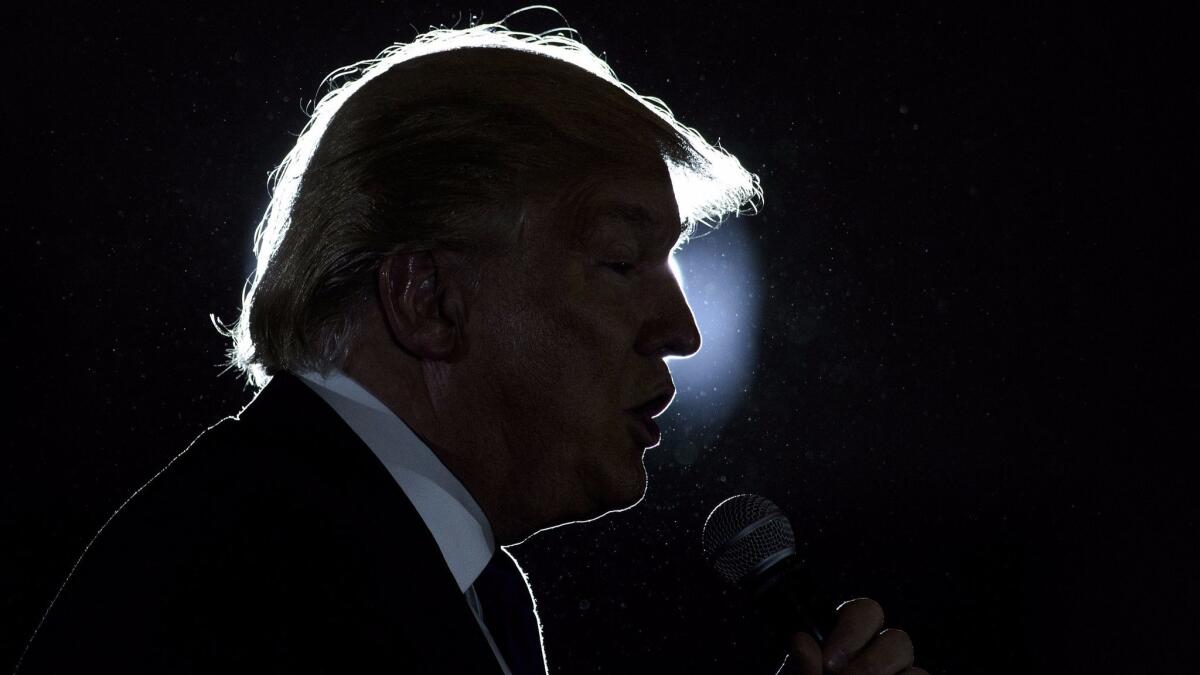John Scalzi’s 10-point plan for getting creative work done in the time of Trump

- Share via
It’s not a great secret that Donald Trump and his incoming administration are not hugely beloved by America’s creative class — the difficulty Trump is having in finding performers for his inauguration is only the most obvious manifestation of this. What’s probably less known is that Trump’s election put a number of creative people into mental tailspin. Not only for the fact of his election, but for what his policies mean for creatives: The possible disappearance of the Affordable Care Act, through which many creative people were able to secure health insurance, is just the tip of the iceberg for many.
People who don’t make their living through creative endeavors often suppose turbulent times make for great art, but the truth is that for many artists, being worried or anxious or depressed steals away the ability to create. The new reality of Trump’s America means a lot of creatives have to readjust — find a new balance to get back to creating.
How to do that, if you are creative person knocked for a loop by the election? Here are some of the things I’ve done, and that other writers and creatives are telling me they are doing.
1. Acknowledge it’s bad, and other facts of life. There’s no avoiding it: On Jan. 20, there’s an administration coming into office that fills a lot of creative people with despair. If you’re one of those people, don’t run from that fact or try to shove it down to some part of your brain where you don’t have to think about it, because denial won’t change the fact.
At the same time, recognize that no matter who is in power, you still have work and create, and, especially if your creative work is some significant part of your income, you have to get on with it to eat and pay bills and pamper your pets. It’s all right to acknowledge that day-to-day life exists, even in the face of existential crisis. Indeed, if you’re taking care of your day-to-day, you’re usually in a better position to deal with everything else.
2. Figure out your bandwidth. Some people can engage in the world, including social media, and all its bad news, and still get their work done. Some people need to remove themselves almost completely. Most creative people live somewhere in between. Ask yourself how much space your brain needs for creative work, and how much distance it needs from the outside world to do it. Don’t rationalize it or try to compensate for it; err on the side of you. If reading the news and your friends’ posts on Facebook and Twitter makes it hard for you to give brain cycles to your creative side, face it, acknowledge it and plan accordingly. And don’t feel bad about it.
3. Disconnect (temporarily). Especially now, it might be useful for a “hard reset”: taking a week (or two! Or more!) away from most news and social media in order to give your brain the equivalent of a few deep, cleansing breaths and the ability to switch focus away from the outside world and back into your internal creative life.
It’s often hard to do this — social media in particular is specifically designed to make you feel like if you’re not constantly attached to it then you’re missing something important. But here’s the thing: Even if it were true (which it usually is not), there are millions of other people out there to deal with it while you take a week off from the world to get your head right. Let them.
The truth is that for many artists, being worried or anxious or depressed steals away the ability to create.
4. Create creative space daily. When I’m writing a novel, I find that my best creative time is the first thing in the morning. My brain is fresher, I feel more inventive, and my brain is not cluttered up with the news of the day. So I get up and get to the day’s writing work, and get to my daily quota (which for me is 2,000 words, or four hours of writing, whichever comes first) before going on the Internet, checking my email and social media accounts, or diving into news sites.
When are you most creative? Find that time and then create (and guard) that time in your daily routine. Disconnect the phone, turn off the TV, disconnect the Internet and dive in to your work.
5. Reconnect (judiciously). When you go back to the news of the world, and to social media, it’s perfectly all right to ask yourself: Is this making me happy? Is it giving me useful information? Is it inspiring me to engage in the world or does it make me want to run from it?
If it’s not helping you, let it go. Unfollow that Facebook friend passing along fake news, and block those fake news sites outright. Mute that person on Twitter who is apparently always angry. Evaluate the news sources you read and keep the ones that offer news accurately and truthfully (spin is spin, even if it’s spin you like). Design your media intake to be useful, truthful and less stressful.
6. Do other things that make you happy. News and social media expand to fill the space you allot to them. Last year, I realized I was spending so much time watching my friends freak out on Twitter and Facebook that I read fewer books and spent less time with my other hobbies. This year, I’m intentionally carving out space to read, to play music, and to enjoy the movies and TV shows I haven’t caught up on. Likewise:
7. Connect with friends and community. The weekend after the election, when I and most creative people I knew felt especially low, I went to a wedding of friends, with other friends in attendance. For those several hours we laughed and joked and enjoyed life and remembered that even in dispiriting times, when it’s easy to curl up into a defensive ball or to shut people out, your friends and community will do a lot to see you through. They will inspire you creative. They will plan with you politically. And they don’t mind your goofy dance moves (or if they do, they’ll let it slide anyway).
8. Give help when you can. Many creative folks have made protesting and resisting a priority for the new year. But you find you don’t have the time or mental bandwidth to engage with the world and still be creative, there are still things you can do to protest and to help others. Among the simplest: Give money to organizations that are looking out for the people most at risk under the new administration. Do likewise for people you know in need. We’re in an era where “pay it forward” is an especially evocative phrase.
9. Get help if you need it. Everything above is a coping mechanism designed to help you stay creative and engaged in a challenging time. But you know what? Sometimes articles with lists aren’t enough. Sometimes depression and anxiety don’t go away with helpful tips. There’s no shame in acknowledging depression and anxiety as real things that benefit from treatment. And in many cases, treating them can clear a path to becoming creative again. Get help; it’ll help.
10. Remember: Your work matters. There are people who rationalize that the next few years will be great for art, in the way that Margaret Thatcher’s rule was great for music in the UK in the ’80s. I don’t think much of that argument — there’s always great art, in every political climate — but I do think it’s true that people will need art and the creative people who make it. Your work will matter to someone; it will help them get through. But only if you make it in the first place. Take care of yourself, then get to work.
John Scalzi, a Los Angeles Times critic at large, is a Hugo award-winning novelist.
More to Read
Sign up for our Book Club newsletter
Get the latest news, events and more from the Los Angeles Times Book Club, and help us get L.A. reading and talking.
You may occasionally receive promotional content from the Los Angeles Times.





